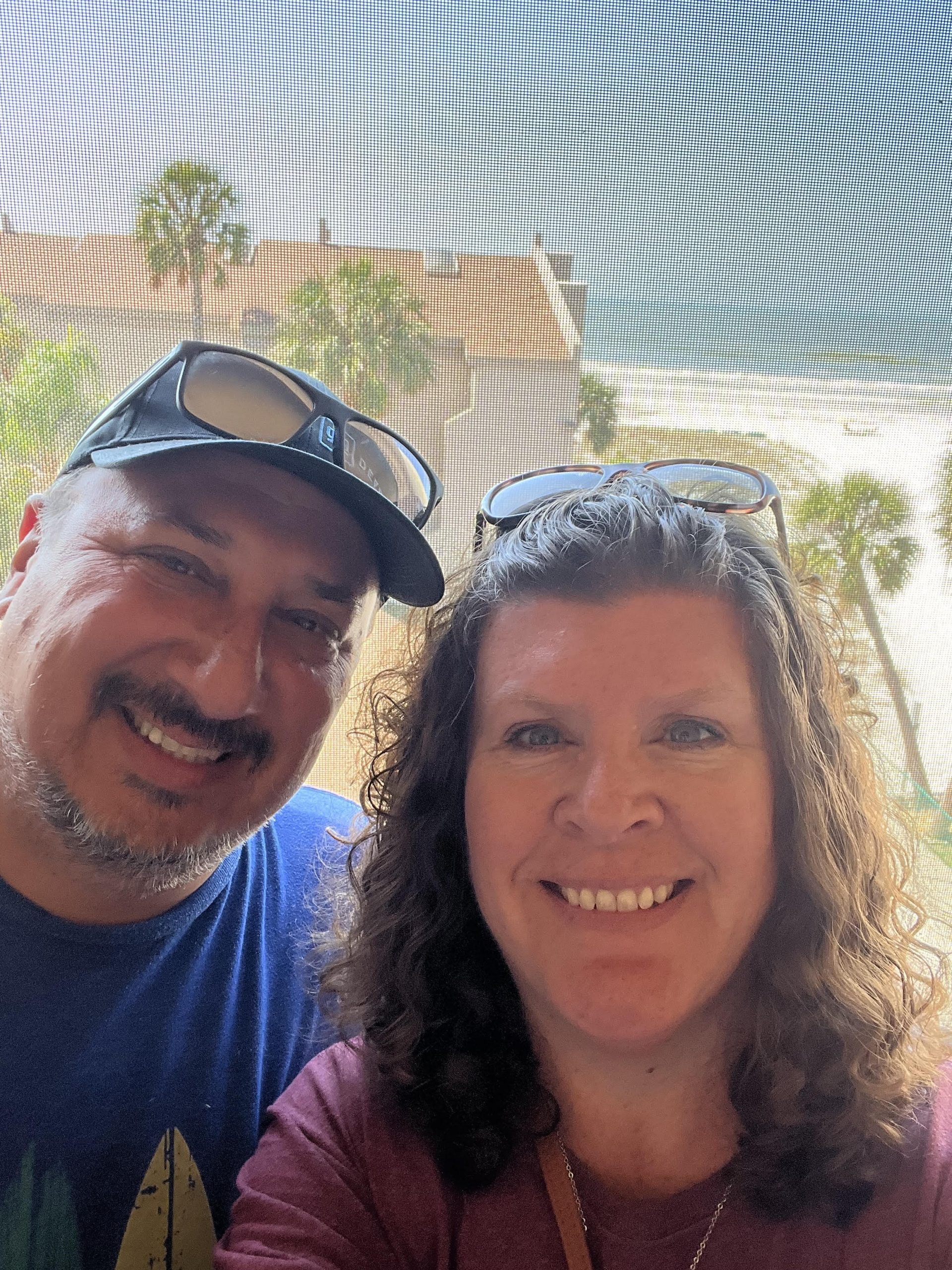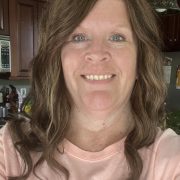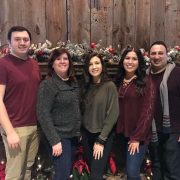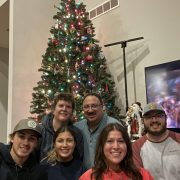Persistence & Hope in the Face of Pancreatic Cancer: Chris Davis’s Story
Contributing Writer
Julia Brabant
August, 2024
Date of Diagnosis: Feb. 7, 2020
Persistence & Hope in the Face of Pancreatic Cancer: Chris Davis’s Story
Chris Davis, a wife and mother of three, first found out she had pancreatic cancer during the onset of the COVID-19 pandemic. Since then, she’s ridden a rollercoaster of triumphs and setbacks, with each twist and turn reminding her of both the fragility of life and the resilience of her own spirit.
Chris started experiencing flu-like symptoms on Christmas Day in 2019. Nausea and vomiting followed and lingered, and one of Chris’s three adult children urged her to see her doctor. The doctor ran some blood tests and directed Chris to have a CT scan and see a gastroenterologist.
Chris’s GI doctor identified a mass and conducted a biopsy. After reviewing the results, the doctor diagnosed Chris with pancreatic cancer. He recommended Chris begin chemotherapy with the hope that it might make her eligible for a Whipple surgery, a potentially lifesaving procedure that may be available to some patients in the earlier stages of pancreatic cancer.
Chris moved forward with chemo for several months, but she eventually developed complications that affected her gallbladder. Her care team decided to take her off chemo and move forward with scheduling surgery.
Chris had the Whipple procedure – in her case, an 11-hour procedure – July 20, 2020. Her surgery was especially complex given how close her tumor was to one of her arteries.
“Recovery was rough – it was one of the worst things I’ve ever been through,” Chris said. “It’s right up there with childbirth.”
Chris spent five days recovering in the hospital and then a few more weeks resting at home before going back to work part-time at a local school. In hindsight, she thinks the return to work might have been premature, finding that she felt fatigued easily after doing so.
The fatigue may have also been a result of the adjuvant chemotherapy Chris had, which is follow-up chemo administered after surgery to lower the chances of a cancer recurrence. After her Whipple, Chris had three more rounds of chemo and then 25 days of radiation to help combat any remaining cancer cells.
“There weren’t many ups and a lot of downs,” Chris said. “But I made it through.”
Adjusting to life after a Whipple also had its peaks and valleys. Chris became reliant on CREON, a digestive enzyme she has to take before every meal or risk facing uncomfortable consequences. That said, she feels fortunate to still be able to eat a wide variety of foods, with mainly just fried, greasy foods like fish and chips becoming completely off-limits.
Chris also participated in a clinical trial the year after her Whipple procedure. The trial, led by researchers at Thomas Jefferson University in Philadelphia, Pennsylvania, had participants take injections intended to help train their bodies to start recognizing and targeting cancerous cells.
Chris continued to see her doctor for periodic tests, and in September 2022, tests showed that her CA 19-9 numbers had risen. High CA 19-9 numbers can indicate pancreatic cancer, but they can also be a sign of liver disease, bile obstruction or other gastrointestinal cancers.
Chris’s Physician’s Assistant recommended keeping an eye on things, but Chris and her family felt dissatisfied with that response. She and her family began researching anything and everything that could potentially help her build up immunity while figuring out next steps, from taking different supplements to trying Eastern medicine techniques, such as acupuncture.
By December 2022, Chris had learned about another clinical trial where rising CA 19-9 numbers were one of the qualifications. Her participation in the trial was dependent on the results of a CT scan. Chris’s scan revealed a spot on one of her lymph nodes, and the research director told her he wouldn’t be able to include her in the trial. He did, however, urge her to have the spot biopsied.
At this point, Chris and her family thought it best to get second and third opinions. They began researching programs at other local hospitals, and Chris also told her existing surgeon about no longer being eligible for the clinical trial at Thomas Jefferson.
Her surgeon, upon determining that Chris’s recurrence was confined to her mesenteric lymph node, told Chris he thought he could get it out. Had it metastasized to other areas, too, this may not have been an option.
Chris’s surgeon removed the concerning area Feb. 1, 2023. After several weeks of recovery, Chris returned to work for a day and then a took a week’s vacation to Florida. After returning, she resumed chemotherapy once again from March until June.
After completing chemo, Chris’s care team determined her CA 19-9 numbers were still rising. Her doctor asked if she’s been taking biotin, a B vitamin that can promote hair growth, citing a recent FDA article that said biotin has the potential to elevate CA 19-9 numbers.
Chris stopped taking the supplement, but subsequent tests in December 2023 showed a small tumor and her numbers continuing to rise. In February 2024, Chris’s doctor took her case in front of the hospital’s tumor board in an effort to determine next steps.
The team decided to try more chemotherapy with the hope of reducing the size of Chris’s tumor enough to make it operable. She underwent eight additional rounds of chemo, and it worked as her care team intended, with her surgeon agreeing to move forward with surgery sometime during the fall of 2024. If her medical team is unable to remove the tumor, Chris will likely begin radiation as an alternative.
In the meantime, Chris continues to work full-time in education, and she has also begun fielding questions from other members of the pancreatic cancer community and offering up guidance based on her own experiences.
“Find a hospital that has a pancreatic cancer specialty, whether it’s a division, a wing or someone who knows a lot about this particular cancer,” Chris said. “And on your good days, try to meal prep, because you’re going to have those bad days when you don’t feel like cooking.”
Chris feels fortunate to have had support from her church during her own treatment, with members forming a meal train and delivering food to her doorstep every other day.
“It was comforting to me to know that my own family was being fed even if I didn’t feel like eating,” she said. “That was really helpful. It’s so hard to ask for and accept help when people want to give it. People are helpful and they want to help, but it’s hard to accept. It’s humbling.”
Chris also emphasized how important it is to have a support network.
“Having a support system is really important,” she said. “I’m so thankful for my family and friends’ support, whether it was a meal, getting me to and from chemo or making sure I eat. I couldn’t have done it without them.”
Finally, Chris encourages other people facing pancreatic cancer to question everything their doctors say, even if they have faith in their care teams.
“Be an advocate for yourself. If something doesn’t sound right, don’t just accept what the doctors say. Question everything. Know that you’re not alone, and fight every day.”








